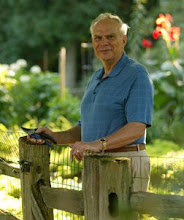I was freshly struck by this poem of GMD"s, "Tell Me":
"Traveller, what lies over the hill?
Traveller, tell to me:
Tip-toe-high on the window sill
Over I cannot see."
"My child, a valley green lies there,
Lovely with trees, and sky'
And a tiny brook that says, 'Take care,
Or I'll drown you by and by!'"
"And what comes next?"--"A little town,
And a towering hill again;
More hills and valleys up and down,
And a river now and then."
"And what comes next?"--"A lonely moor
Without one beaten way,
And slow clouds drifting dull before
A wind that will not stay."
"And then?"--"Dark rocks and yellow sand,
Blue sea and a moaning tide."
"And then?"--"More sea, and then more land,
With rivers deep and wide."
"And then?"--"Oh, rock and mountain and vale,
Ocean and shores and men,
Over and over, a weary tale,
And round to your home again!"
"And that is all? From day to day,
Like one with a long chain bound,
Should I walk and walk and not get away,
But go always round and round?"
"No, no; I have not told you the best,
I have not told you the end.
If you want to escape, away in the west
You will see a stair ascend,
"Built of all colours of lovely stones,
A stair up into the sky
Where no one is weary, and no one moans,
Or wishes to be laid by."
"Is it far away?"--"I do not know:
You must fix your eyes thereon,
And travel, travel through thunder and snow,
Till the weary way is gone.
"All day, though you never see it shine,
You must travel nor turn aside,
All night you must keep as straight a line
Through moonbeams or darkness wide."
"When I am older!"--"Nay, not so!"
"I have hardly opened my eyes!"
"He who to the old sunset would go,
Starts best with the young sunrise."
"Is the stair right up? Is it very steep?"
"Too steep for you to climb;
You must lie at the foot of the glorious heap
And patient wait your time."
"How long?"--"Nay, that I cannot tell."
"In wind, and rain, and frost?"
"It may be so; and it is well
That you should count the cost.
"Pilgrims from near and from distant lands
Will step on you lying there;
But a wayfaring man with wounded hands
Will carry you up the stair."
--George MacDonald






